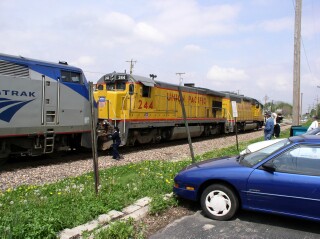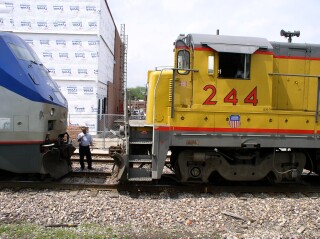
Frank in SBA
And thanks Sherrif.
JMA
Hot water, heating, and I believe also air conditioning was operated by steam. In steam engine days, the source was obvious. After diesels, passenger diesels and had a steam generating boiler at the back end to provide the steam. There was a steam line that ran the length of the train. In that sense, there has always been head end power, but not for electricity until well into Amtrak.
Therefore, even after dieselization, the fireman on passenger trains still had fire related duties, but admittedly it did not keep him busy full time. I would assume that the electrics on Pennsy, NH, Milwaukee also had to have a steam generator. Were they operated off of liquid fuel or electricity? I have no idea.
There was an exhaust about mid car. This is why you will see steam rising about mid car on some or all of the passenger cars in pictures of trains stopped or moving slow in cold weather. If the train was moving fast it was not usually noticible. The couoplings between cars tended to leak, particularly a maintenance fell off in the later years. This would give you a plume of steam rising up next to the door.
Steam heat has been gone for a long time now, so when you see these beautiful steam effects in movies of Amtrak or modern commuter trains, it is completely bogus.
The ATSF bi-levels were originally steam, but the superliners and amfleet cars were never equipped for use with steam.
That is a standard here in Taiwan for the diesel hauled passenger trains. On the electrified side the electrics (built by General Electric, USA) provide the power, but by convertor, not a diesel-generator set.
First, the only Amtrak procured locomotives to be delivered with auxiliarry HEP generators were the GE P-30-CH #700-25, or best known in railfan circles as "pooches". Additionally, several E-8's were rebuilt with HEP auxilliary power sets.
Amongst commuter agencies, the several Chicago area roads using bi-level equipment rebuilt both E and F units with auzilliary HEP units.
All other Amtrak locomotives, such as the F-40's and the various GE "Genesis' units all have their HEP capacities driven by the prime mover. This is why F-40 prime mover always operated at a high constant speed.
Regarding the Santa Fe Hi-Level cars, each of these cars when delivered had its own internal "Hotel'(HVAC, lighting) driven by a small diesel generating set. These units were removed by Amtrak when the cars were converted to HEP. Other railroad ordered cars so equipped included UP Domes, and the full length Domes ordered by ATSF, GN, and MILW. Of further interest, the C&NW, MILW, and SP all had fleets of cars that used propane (Waukesha) powered engines for "Hotel". However, since steam was the primary source of heat, and as noted by Mr. Harris, air conditioning, all of these cars still had steam "train lines" lest other cars on the train require such.
Regarding the "power cars" operated by Amtrak, this was just one more thing Amtrak was compelled to do under "crisis conditions". Somewhere, long about summer 1975, Amtrak realized that the Amfleet cars were going to be delivered "on time" (lest we forget, they were simply a "cobbling" of existing railcar technologies drawn from the Pioneer non powered cars and Metroliner carbodies; further lest we forget, Amfleets were designed and built by Budd and not by whatever committee at Amtrak won the daily game of musical chairs), and, considering the delivery of E-60's was delayed, they had nothing on the roster that could provide their "hotel". So hurredly, some cars (primarily 60' Baggage cars) were stripped, and a CAT generating set was installed. Well, let's just leave it at "sometimes they worked, but other times, they didn't'.
Therefore, an Amfleet equipped train between Oct 1975 (when Amfleets entered revenue service) and March 1976 (when the E-60's made their belated "debut") comprised a GG-1, Amfleet cars, and (either on the head or rear), the Power Car.
Lastly, there was an interesting operation on the Corridor that lasted until the Southern Ry joined Amtrak during 1983 - and that was a train that needed both steam and HEP. This was the train with which the through SRY Coaches and Sleepers were interchanged at Wash. This train, usually #171-172, would be comprised of a GG-1 or one of the five E-60's with steam generators, the SRY interchanged cars on the head, the Amfleets, AND a Power Car on the rear.
Now JonA, to answer your question about fixing the wiring. Sometimes the conection cables default and that has to be bypassed in order for the rest of the train to get electricity. This is called making a "short loop." Two HEP cables run down both sides of the train (two on the right and two on the left). Every car has a male and female connection on both sides and on both ends of the car. If their is a failure in the right side (or left side) of the train, it will show up on the Engineers control panel. We conductors have to walk the train and wiggle all the cables to find the bad one and which car it is connected too. Once we wiggle the bad cable, it will flicker on the Engineers control panel and we know we have the right one. We then disconect the cable at that point and replug it back into the same car in which the male portion came out of. We do the same thing with the other car. This deverts the electricity over to the other side of the train so that it will continue through to the rear of the train.
Some notes here: passenger cars have two electrical systems, low voltage (DC, battery backed up) for some lighting and some fans. High voltage AC is for air conditioning. Heat (and maybe A/C - see below) came from steam. At that note, the voltage and accessory options were all over the map and was a MAJOR reason why Amtrak's early years were a nightmare. Different RRs picked different options (who, us STANDARDIZE???) and the results were chaos when trying to make up a train from different previous owners. Low VDC ranged from 24, 32, 48, and 54 VDC and high was 110 or 240VAC depending on...? Some 110VDC systems were in the mix too. (YEESH!!) And let's not forget that the Santa Fe used STEAM ejector A/C systems just to be - uh, wierd?
Amtrak HAD to cut this mess out and set things right. 480 VAC 3 phase was selected because (I believe) the C&NW used it to power their commuter fleet and it also used standard shipboard power cables, connectors, and control stuff. Off-the-shelf IS A GOOD THING. But note that cars still have DC systems for us when HEP is off, although it's limited to lights and some fans (but NOT air conditioning) to keep things safe.
Now ya know....
------------------
JONATHON D. ORTIZ
I remember hearing some about the various electrical and mechanical systems used pre-Amtrak, but there had to be compatibility to some extent at some level. Remember the many run through sleepers, car swapping, and run through trains pre_Amtrak? How were these handled? At one time must of the players in the passenger business were involved.
To name a few: The seasonal car swapping of Norhtern Pacific domes to be used in winter on the ICRR-CofG-ACL-FEC City of Miami. There were Pennsy and B&O to MoPac and MKT at St. Louis, the NC&StL to Southern Nashville to Knoxville sleeper, the mix of Southern and Frisco equipment on the KC-Florida Special, etc, etc, the NYC - Southern Chicago to Asheville sleepers on the Carolina Special, just to name a few.
Also, some of these trains would be made up of equipment by multiple builders put together anywhere between the 20's and the 50's.
Did anybody ever run a through train involving more railroad companies than the Dixie Flagler? C&EI, L&N, NC&StL, AB&C, ACL, FEC. (All except FEC now in CSX). The east coast trains to Florida ran on three railroads on the SAL and four for the ACL trains. Pennsy, RF&P, SAL, or Pennsy, RF&P, ACL, FEC.


This is in Normal IL, and neither of these yellow engines had HEP. It was warm for the 2 1/2 hours into Chicago.

[This message has been edited by mikesmith (edited 05-15-2004).]